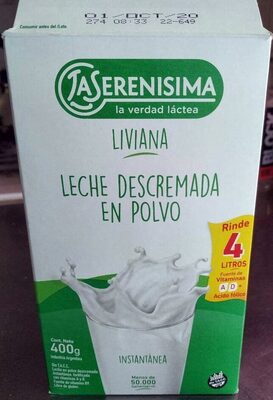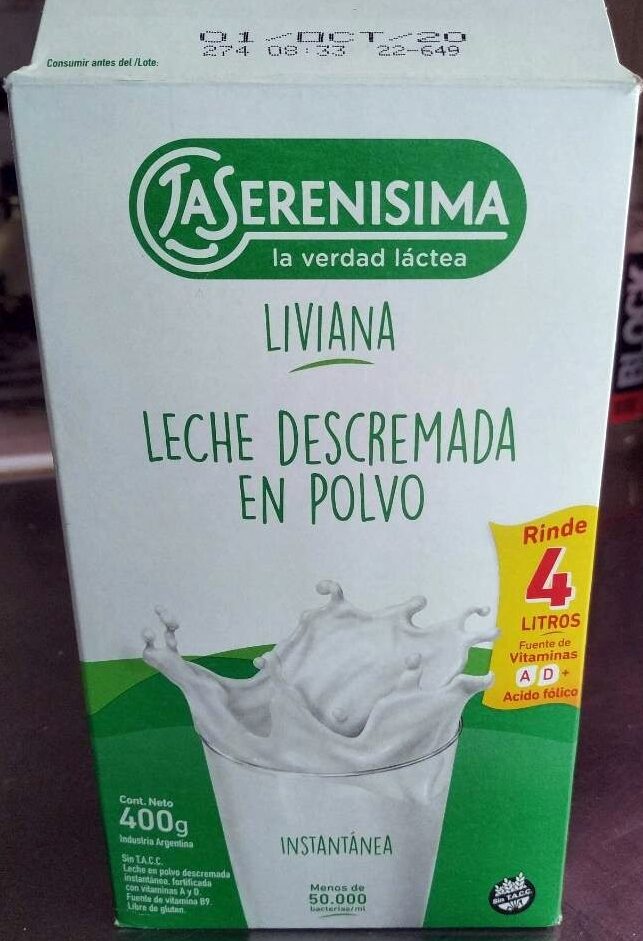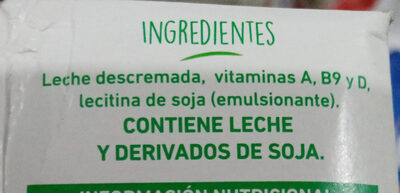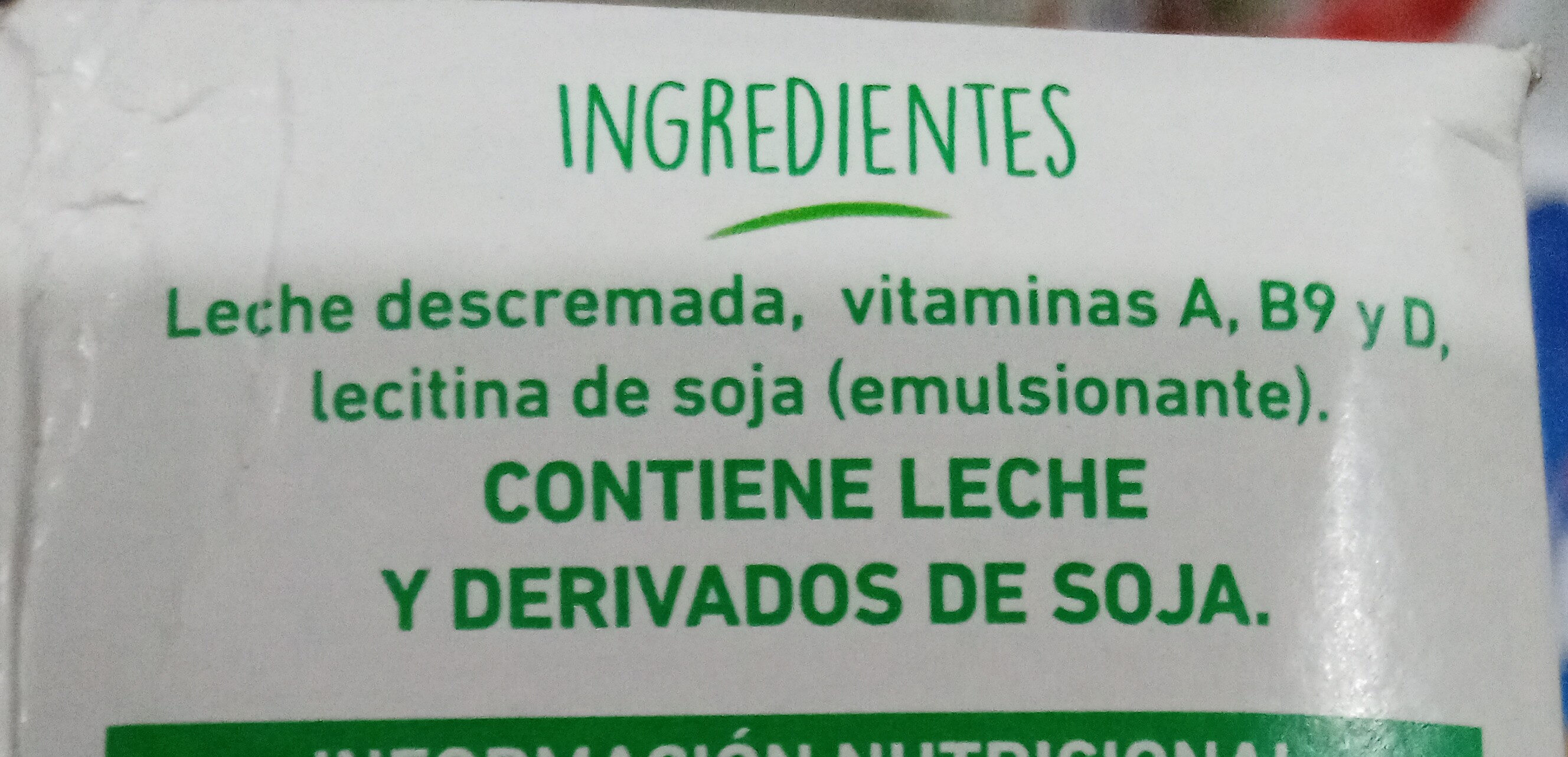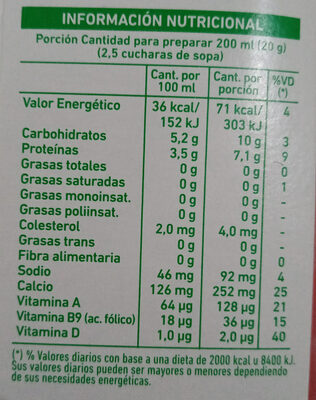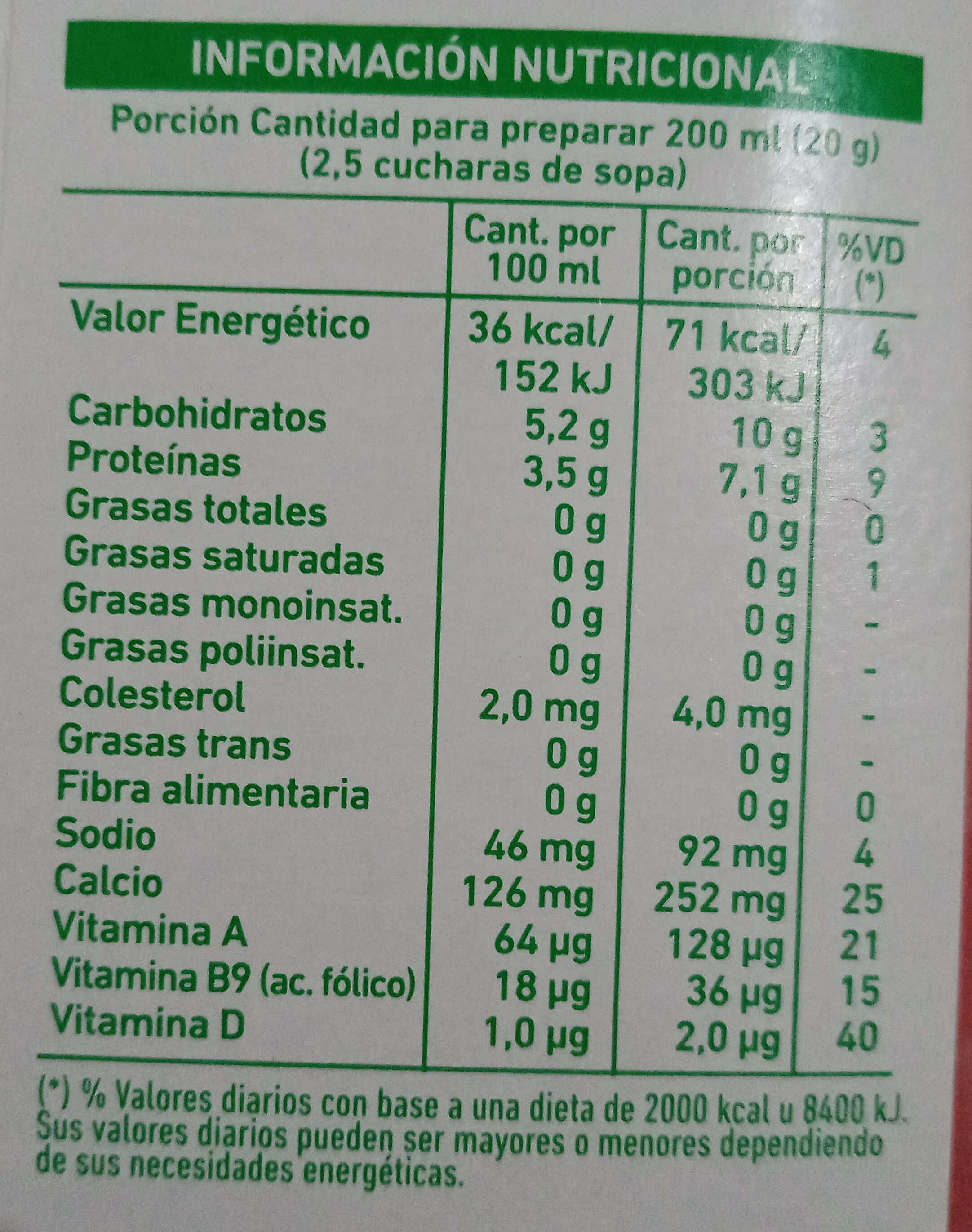Help us make food transparency the norm!
As a non-profit organization, we depend on your donations to continue informing consumers around the world about what they eat.
The food revolution starts with you!
Leche Descremada en Polvo Instantánea - La Serenisima - 400 g
Leche Descremada en Polvo Instantánea - La Serenisima - 400 g
This product page is not complete. You can help to complete it by editing it and adding more data from the photos we have, or by taking more photos using the app for Android or iPhone/iPad. Thank you!
×
Barra-kodea: 7790742106605 (EAN / EAN-13)
Kopurua: 400 g
Ontziratzea: en:Plastic, 22 PAP, en:Bag, en:Box
Markak: La Serenisima
Kategoriak: en:Beverages, Esneki, en:Dried products, Esne, en:Dried products to be rehydrated, en:Dehydrated beverages, en:Skimmed milks, en:Cow milks, en:Milk powders, en:Skimmed milk powder
Etiketak, ziurtagiriak, sariak:
en:No gluten, es:Sin TACC
Origin of ingredients: Argentina
Manufacturing or processing places: Argentina
Traceability code: RNE 02030008, RNPA 02583373
Matching with your preferences
Health
Osagaiak
-
7 ingredients
: Leche descremada, vitamina A, vitamina B9, vitamina D, emulsionante (lecitina de soja)Alergenoak: en:Milk, en:Soybeans
Food processing
-
Ultra processed foods
Elements that indicate the product is in the 4 - Ultra prozesatutako elikagaiak eta edariak group:
- Gehigarria: E322
- Osagaia: Emulsifier
Food products are classified into 4 groups according to their degree of processing:
- Prozesatu gabeko edo ahalik eta gutxien prozesatutako elikagaiak
- Sukaldaritzako osagaiak prozesatu
- Prozesatutako jakiak
- Ultra processed foods
The determination of the group is based on the category of the product and on the ingredients it contains.
Gehigarriak
-
E322
Lecithin: Lecithin -UK: , US: , from the Greek lekithos, "egg yolk"- is a generic term to designate any group of yellow-brownish fatty substances occurring in animal and plant tissues, which are amphiphilic – they attract both water and fatty substances -and so are both hydrophilic and lipophilic-, and are used for smoothing food textures, dissolving powders -emulsifying-, homogenizing liquid mixtures, and repelling sticking materials.Lecithins are mixtures of glycerophospholipids including phosphatidylcholine, phosphatidylethanolamine, phosphatidylinositol, phosphatidylserine, and phosphatidic acid.Lecithin was first isolated in 1845 by the French chemist and pharmacist Theodore Gobley. In 1850, he named the phosphatidylcholine lécithine. Gobley originally isolated lecithin from egg yolk—λέκιθος lekithos is "egg yolk" in Ancient Greek—and established the complete chemical formula of phosphatidylcholine in 1874; in between, he had demonstrated the presence of lecithin in a variety of biological matters, including venous blood, in human lungs, bile, human brain tissue, fish eggs, fish roe, and chicken and sheep brain. Lecithin can easily be extracted chemically using solvents such as hexane, ethanol, acetone, petroleum ether, benzene, etc., or extraction can be done mechanically. It is usually available from sources such as soybeans, eggs, milk, marine sources, rapeseed, cottonseed, and sunflower. It has low solubility in water, but is an excellent emulsifier. In aqueous solution, its phospholipids can form either liposomes, bilayer sheets, micelles, or lamellar structures, depending on hydration and temperature. This results in a type of surfactant that usually is classified as amphipathic. Lecithin is sold as a food additive and dietary supplement. In cooking, it is sometimes used as an emulsifier and to prevent sticking, for example in nonstick cooking spray.Source: Wikipedia (Ingeles)
-
E322i - Lezitina
Lecithin: Lecithin -UK: , US: , from the Greek lekithos, "egg yolk"- is a generic term to designate any group of yellow-brownish fatty substances occurring in animal and plant tissues, which are amphiphilic – they attract both water and fatty substances -and so are both hydrophilic and lipophilic-, and are used for smoothing food textures, dissolving powders -emulsifying-, homogenizing liquid mixtures, and repelling sticking materials.Lecithins are mixtures of glycerophospholipids including phosphatidylcholine, phosphatidylethanolamine, phosphatidylinositol, phosphatidylserine, and phosphatidic acid.Lecithin was first isolated in 1845 by the French chemist and pharmacist Theodore Gobley. In 1850, he named the phosphatidylcholine lécithine. Gobley originally isolated lecithin from egg yolk—λέκιθος lekithos is "egg yolk" in Ancient Greek—and established the complete chemical formula of phosphatidylcholine in 1874; in between, he had demonstrated the presence of lecithin in a variety of biological matters, including venous blood, in human lungs, bile, human brain tissue, fish eggs, fish roe, and chicken and sheep brain. Lecithin can easily be extracted chemically using solvents such as hexane, ethanol, acetone, petroleum ether, benzene, etc., or extraction can be done mechanically. It is usually available from sources such as soybeans, eggs, milk, marine sources, rapeseed, cottonseed, and sunflower. It has low solubility in water, but is an excellent emulsifier. In aqueous solution, its phospholipids can form either liposomes, bilayer sheets, micelles, or lamellar structures, depending on hydration and temperature. This results in a type of surfactant that usually is classified as amphipathic. Lecithin is sold as a food additive and dietary supplement. In cooking, it is sometimes used as an emulsifier and to prevent sticking, for example in nonstick cooking spray.Source: Wikipedia (Ingeles)
Ingredients analysis
-
en:Palm oil free
No ingredients containing palm oil detected
-
en:Non-vegan
Non-vegan ingredients: en:Skimmed milk
-
en:Vegetarian status unknown
Unrecognized ingredients: Azido foliko, D bitamina
-
Details of the analysis of the ingredients
: Leche descremada, vitamina A, vitaminas, vitamina B9, vitamina D, emulsionante (lecitina de soja)- Leche descremada -> en:skimmed-milk - vegan: no - vegetarian: yes - ciqual_proxy_food_code: 19051 - percent_min: 16.6666666666667 - percent_max: 100
- vitamina A -> en:vitamin-a - vegan: yes - vegetarian: yes - percent_min: 0 - percent_max: 50
- vitaminas -> en:vitamins - vegan: yes - vegetarian: yes - percent_min: 0 - percent_max: 33.3333333333333
- vitamina B9 -> en:folic-acid - percent_min: 0 - percent_max: 25
- vitamina D -> en:vitamin-d - percent_min: 0 - percent_max: 20
- emulsionante -> en:emulsifier - percent_min: 0 - percent_max: 16.6666666666667
- lecitina de soja -> en:soya-lecithin - vegan: yes - vegetarian: yes - ciqual_food_code: 42200 - percent_min: 0 - percent_max: 16.6666666666667
Elikadura
-
Missing data to compute the Nutri-Score
Missing nutrition facts
⚠ ️The nutrition facts of the product must be specified in order to compute the Nutri-Score.Could you add the information needed to compute the Nutri-Score? Add nutrition facts
-
Nutrition facts
Nutrition facts As sold
for 100 g / 100 mlAs sold
per serving (20 g (2.5 cucharas / 200ml))Compared to: en:Milk powders Energia 152 kj
(35 kcal)303 kj
(71 kcal)-% 86 Koipe 0 g 0 g -% 100 Gantz-azido ase 0 g 0 g -% 100 Gantz-azido monoasegabe 0 g 0 g Polyunsaturated fat 0 g 0 g Trans fat 0 g 0 g Kolesterol 2 mg 4 mg Carbohydrates 5 g 10 g -% 87 Azukre ? ? Fiber 0 g 0 g Proteina 3,55 g 7,1 g -% 75 Gatz arrunt 0,115 g 0,23 g -% 80 A bitamina 64 µg 128 µg D bitamina 1 µg 2 µg Vitamin B9 (Folic acid) 18 µg 36 µg Kaltzio 126 mg 252 mg Fruits‚ vegetables‚ nuts and rapeseed‚ walnut and olive oils (estimate from ingredients list analysis) 0 % 0 %
Ingurumena
-
Eco-Score E - Very high environmental impact
The Eco-Score is an experimental score that summarizes the environmental impacts of food products.→ The Eco-Score was initially developped for France and it is being extended to other European countries. The Eco-Score formula is subject to change as it is regularly improved to make it more precise and better suited to each country.Life cycle analysis
-
Average impact of products of the same category: E (Score: 0/100)
Kategoria: Milk, powder, skimmed, non rehydrated
Kategoria: Milk, powder, skimmed, non rehydrated
- PEF environmental score: 1.53 (the lower the score, the lower the impact)
- including impact on climate change: 14.82 kg CO2 eq/kg of product
Stage Impact Agriculture
98.5 %Processing
0.0 %Ontziratzea
0.6 %Transportation
0.6 %Distribution
0.3 %Consumption
0.0 %
Bonuses and maluses
-
Origins of ingredients with a high impact
Malus: -3
Environmental policy: -3
Transportation: 0
Origin of the product and/or its ingredients % of ingredients Impact Argentina 100 %Altua
-
Packaging with a medium impact
Malus: -11
Shape Material Recycling Impact 1 Box Plastic Altua 1 Bag 22 PAP Baxua
Eco-Score for this product
-
Impact for this product: E (Score: -14/100)
Produktua: Leche Descremada en Polvo Instantánea - La Serenisima - 400 g
Life cycle analysis score: 0
Sum of bonuses and maluses: -14
Final score: -14/100
-
Carbon footprint
-
Equal to driving 7.7 km in a petrol car
1482 g CO² per 100g of product
The carbon emission figure comes from ADEME's Agribalyse database, for the category: Milk, powder, skimmed, non rehydrated (Source: ADEME Agribalyse Database)
Stage Impact Agriculture
98.5 %Processing
0.0 %Ontziratzea
0.7 %Transportation
0.7 %Distribution
0.1 %Consumption
0.0 %
Ontziratzea
-
Packaging with a medium impact
-
Packaging parts
1 x Box (Plastic)
1 x Bag (22 PAP)
-
Bilgarriaren materialak
Material % Bilgarriaren pisua Bilgarriaren pisua produktuaren 100g-ko Paper or cardboard Plastic Guztira
-
Transportation
-
Origins of ingredients
Origins of ingredients with a high impact
Origin of the product and/or its ingredients % of ingredients Impact Argentina 100 %Altua
Report a problem
-
Incomplete or incorrect information?
Category, labels, ingredients, allergens, nutritional information, photos etc.
If the information does not match the information on the packaging, please complete or correct it. Open Food Facts is a collaborative database, and every contribution is useful for all.
Datuen iturria
Product added on by elcoco
Last edit of product page on by 5m4u9.
Produktuaren orria -gatik editatua elcoco.4b5eea708fa070bce73a5ba6ea71ad5e, flipwared, jobertic, musarana, openfoodfacts-contributors, packbot.
